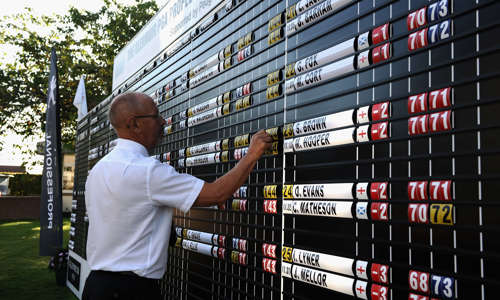
Gleneagles is arguably the most famous golf resort in the world. Golf Business Quarterly speaks to managing director Conor O’Leary to hear about the five-star destination’s gentle repositioning, dealing with a pandemic in the hospitality sector and what it's like to host both the Ryder and Solheim Cups.
GBQ is a benefit of the Business Management Group. Exclusive to those who sign up to BMG Plus and BMG Premium options, GBQ is available both digitally via the members' area of The PGA website and is mailed out each quarter.
CLICK HERE to find out how you can join The PGA's Business Management Group.
In 1824, Gleneagles was described as the ‘eighth wonder of the world’ and little, in that regard, has changed since. Every nook and cranny of the 850-acre estate has been thought about, so, however you like to enjoy yourself, you will likely find pleasure in spades in this corner of the Perthshire countryside. At the heart of the operation is Conor O’Leary, who joined in 2016 as the hotel manager before being promoted to managing director in 2020.
The early days
The youngest of three children, he was born in Sevenoaks and moved to Stratford-upon-Avon, via Hertfordshire, when he was 11. His parents were from Dublin, relocating to England when his dad became a technical designer for the BBC’s outside broadcast vehicles and equipment. His mum, after bringing up three children, worked in a job centre: “She loved doing that, she loved helping people,” said O’Leary.
His footballing days were numbered when he joined a rugby-playing secondary school, and he switched from centre-back to full-back. Weekends were spent mopping up as the last line of defence for a local team.
“I don’t think I had any great designs on a career or sphere,” he said. “I went to a solicitors for a week’s work experience, and I wasn’t particularly thrilled with that. I loved socialising with friends and playing sport, and I think that I just thought that I would find my way into a career that allowed me to do those things.”
A brief stint at university saw a business and economics degree come to a premature end. “In hindsight I was one of those people who needed to take a year off and I was just wasting my time and my parents’ money,” he said.
Having worked in the local Stratford restaurants and hotels, he got a taste for the hospitality world. “There was a thing called the AA Hotel Guide and I wrote to 10 five-star hotels in London. Half replied, and I got three interviews. I joined a hotel in Kensington and started working my way up the ladder.”
Coming to Gleneagles
In 2015, Scotland’s most famous hotel came under new ownership, and Ennismore, a London-based hospitality developer and relative new kid on the block, sought to return Gleneagles to being one of the leading lights, not only in the golfing world but also in the hospitality and hotel sphere.
By this time, O’Leary was working in the Middle East with Hyatt. “I knew a few people connected to Gleneagles, and they had maybe said some nice things about me. We had some phone calls, and I spent three days in Scotland. They had clear expectations of where they wanted to take Gleneagles. They had taken on the best interior design firms and had invested well. I very much enjoyed their vision.”
There has also been a repositioning of the Gleneagles brand and a changing of the golf-led narrative. For years, the resort dined out on its golfing pedigree but undersold its many other attractions.
“A lot of people come here, and it was a bit of a hidden secret. Lots of families and multi-gen groups were coming, and some small corporate groups, and they were having holidays without playing golf. Instead, they were shooting, fishing, eating, drinking, walking or going to the spa. Now, we’re talking about golf to golfers, but we’re also talking about family breaks, activities, leisure, our gun dogs and horses, even our ferrets, and we have tried to create a more emotional connection to staying at Gleneagles other than to stay in a hotel and have a round of golf," he said.
The numbers also reflect how the visitors choose to spend their time. Across the year, the same number of hotel guests, 10 to 14 per cent, use the golf and the spa with the next biggest driver the shooting school, which also incorporates fishing and archery.
Gleneagles offers 232 country-fitted rooms and suites and eight restaurants, one of which is the two-Michelin-starred (the only one in Scotland) eponymous venue of the late chef Andrew Fairlie.
It’s hard to truly paint a picture of quite how vast and all-encompassing Gleneagles is. Its moniker is ‘The Glorious Playground’, a nod to the early days of the 1920s. Even before the hotel opened, nearly 100 years ago, it staged the first international match between American and British golfers in what is regarded as the precursor to the Ryder Cup.
In 2014, it was the host venue, and it is the only course to host both the Ryder and Solheim Cups. It staged eight successive Scottish Opens from 1987 and this year held its first Senior Open, which was won by Darren Clarke with a winning score of 10-under. Away from the golf, it staged the first outside broadcast in radio in Scotland on its opening night, and it acted as a hospital during World War 2 as soldiers were brought up by train to recuperate. You can still take a direct train from London to Gleneagles. And in 2005, the G8 Summit, hosted by Tony Blair, took place here.
Gleneagles present and future
This year saw the opening of Gleneagles’ first luxury city hotel in Edinburgh, which boasts an all-day restaurant, roof terrace and members’ club. At Gleneagles, it was a ‘relatively normal summer’ after all the disruption. So how, in an ever-changing world, does O’Leary see Gleneagles in the years ahead?
“We were high in business levels last year with very little corporate and virtually no international business so those groups have come back, not to the pre-pandemic ratios but pretty close, and next year it’s looking like business as usual with a few tweaks. The American numbers aren’t quite to the volumes as before, but we’ve had a few bumps with airports, and celebrations like the Edinburgh Festival were 20 per cent down on ticket sales this year. I think in 10 years Gleneagles will still be seen as a destination of choice and leading how people holiday and with an environmental hat on. The aim is to be as relevant and to bring in the generations of the future. From a golf point of view, we hope to still be seen as a tournament venue where we have the world’s best competing but to still be accessible.”
Conor on…Tournament legacies
We have a limited range of tournaments that we will get of an elite level. The Open roster is what it is, and the Scottish Open is played on links courses, so the Ryder Cup is the marquee event that we can have. And we got a European win in Scotland, the weather was incredible and it was played in the right spirit, which has stuck in people’s minds. Everyone has a view on the PGA Centenary course. It's not the same as the King's and Queen's, but we have had a very positive outlook from amateur golfers wanting to play here. It was one of the first Ryder Cups that catapulted viewing figures on Sky, and we were on that curve, which is lucky, but we were part of creating that.
The Solheim Cup was hugely important for us. We are the only European venue to host both cups, but it is so important to support all golf. You couldn't have written the Solheim Cup better. The Saturday weather was brutal, but on the Sunday the weather dropped, it went down to the last putt on the last green and we had another home win. It is critical that we support all areas of golf.
Conor on...Green fees
We have the same prices on all three of our courses and we see them as the same stature. If we were to change that then people would have a perception that one is better than the other. The green fees vary quite a bit as we're mindful that we are seasonal; the winter days are short and can be a bit wet, and we will spread play across the three courses and move the members around so that we have equal traffic on each course.
The bottom line is that we have to have people leaving the courses saying, 'that was good value for money'. And that means the whole journey, from the arrival to the starters and marshals, and we will always look at the market and our competitors. We're not one of the famous links who have a bit of a march on the rest of Scotland in terms of green fees but, once you step inland, we think that we're the leading golf venue and our rates reflect that.
Conor on… Staff career paths
We've built a whole career map so, whether you join as an apprentice greenkeeper, chef or you're working in the hotel, we have various training initiatives. Or, if you're an experienced manager, you can apply to do a degree course where you do your hours in four days and then take the fifth day off to study, and we'll help to fund that.
In terms of upskilling, we've built a grid where we can identify some of your next possible roles and what you need to do and what training we can provide. So, it's an understandable journey and there's nothing hidden. So, if you do the right things and bring the right spirit and energy, you can expect to move up to the next level, and that happens across all the staff. In the old days you would be told to wait and wait whereas now, if you can do these things, then this is the timeline that you can be promoted in. There's no secret, this is how it works and we’ll be true to our word.
Conor on… The golf at Gleneagles
If you are only coming once to Gleneagles you have to play the King’s and that would be the course that I would want to play for the rest of my life. The members play the Queen’s more than the others and that’s the one where I’ll play with my pals. The PGA is a really great test of golf and is the most popular with our green fee payers.
Conor on...Staff retention
Everyone is having challenges in terms of finding and keeping the best staff. I'm a firm believer that you need to be competitive and, if there are some fantastic chefs out there, for example, we need to understand why they're not working here, and is there something more that we can do to make them work here? So we've tasked our teams to really focus on why someone might not be working here and why anyone might be leaving, and we're probably spending more on making sure that we’re the best employer in the business.
That's not just rate of pay, though that is vital, but how we treat them, the benefits, how we listen and adapt and keep evolving and we do more of that now than ever before. In terms of benefits, it's clear that we need to be at least equal to the better rates of pay in the area. We can offer subsidised dining, coaches to bring staff in and out to work from pockets of the population who couldn’t get here too easily, and we have things like a perk box, where you get free coffee, discounts on supermarkets, petrol and clothing, and free birthday gifts. We've not mastered it but we're doing OK.
GBQ is a benefit of the Business Management Group. CLICK HERE to find out more and how you can become a member.




































